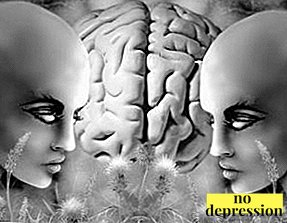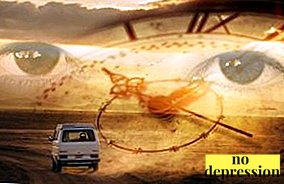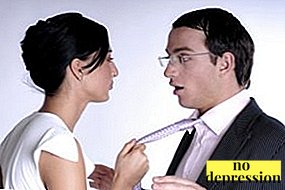Every person knows the feeling when what is happening at the moment the situation seems familiar and seen before.
This phenomenon is called deja vu. The causes of this condition cause a lot of controversy.
Concept

Deja vu - mental state, being in which a person feels like repeating a situation that had already happened to him.
Sensation may arise in relation to specific phrases, movements, events, etc.
condition usually lasts a split second, and in these moments, the person is aware of the entire sequence and nuances of the situation that caused the memories.
At the same time, he can’t specifically remember at what time in his life recurring events occurred at that moment. He only realizes that this was in the past.
Deja vu can not only cause associations in the form of pictures, but also give an idea of what events will now occur and what phrases will be uttered.
Similar phenomenon to some extent reminds extrasensory perception, which causes no less questions and disputes, not having a scientific justification.
Zamevyu - it is a feeling or a state opposite to deja vu, a sudden onset feeling that the familiar seems completely unknown or unusual, seen for the first time. The phenomenon is sometimes compared with short-term memory loss. Translated as "never seen."
What does it mean?

The phenomenon is directly related to the human psyche, with the peculiarities of the brain.
Brain skill keep memories, to analyze unconscious actions and recognize associations leads to the emergence of such a mental phenomenon as deja vu.
Currently, deja vu still remains one of the most mysterious and obscure phenomena in the world. For a long time there was a theory about the direct connection between deja vu and reincarnation (transmigration of the soul).
It was believed that the memories that arise in the mind of a person are events that he experienced in a past life. At the moment, this theory has its adherents, but from a scientific point of view, it is not considered.
There is no consensus among scientists. regarding the nature of this phenomenon. This is explained by the fact that a person cannot predict in advance when a deja vu will occur. Accordingly, it is impossible to study the process scientifically, experimentally.
In any case, deja vu is the influence of certain environmental factors observed by a person on his mental, mental organization.
Upon the occurrence of a given mental state, an unfamiliar place seems familiar, the phrases said by the interlocutor are predicted in advance, and the ongoing actions are performed in a manner known to the person.
That is, deja vu can manifest not only in guessing and remembering a separate element, but also a whole chain of events.
Causes of sensation

Why does deja vu syndrome occur? There are several main causes of this condition:
- Changing the perception of time by the brain. What is happening in the present at the same time seems to a person a current and past event. As a result, there is a simultaneous experience of two processes and there is some separation from reality. Many scientists view this process as a short-term malfunction of the brain, which leads to the prevalence of unconscious sensations.
- Recalling images from dreams. A person may recall a dream in which the events observed at the present moment of time took place.
The analogy with sleep manifests itself because of the images that arise when meeting with certain people, when pronouncing specific phrases or when you are in places already known from dreams.
- The onset of events once modeled in consciousness. A person can take for a deja vu a situation that is as close as possible to his expectations, fantasies and plans. For example, a bride can endlessly present her passage to the altar on the eve of her wedding, see dreams about it. On the day of the celebration, she will feel that all this has already happened to her.
- Association with similar situations from the past. Often, what a person takes for deja vu turns out to be just a memory on which some things, words, and images have pushed him.
 Moreover, the memory can relate to only one specific element, but the mind "thinks out" the rest of the picture and creates the feeling of a complete repetition of the event. For example, when visiting an unfamiliar home, a person can see the same closet that was in his distant childhood at his grandmother’s cottage. A familiar image will cause an association in consciousness that will provoke the perception of the whole situation experienced at the given moment as a whole as experienced earlier.
Moreover, the memory can relate to only one specific element, but the mind "thinks out" the rest of the picture and creates the feeling of a complete repetition of the event. For example, when visiting an unfamiliar home, a person can see the same closet that was in his distant childhood at his grandmother’s cottage. A familiar image will cause an association in consciousness that will provoke the perception of the whole situation experienced at the given moment as a whole as experienced earlier.
Good or bad?
The average person experiences a state of déjà vu hundreds of times in his life. At this moment he has observed some change in the perception of reality.
He plunges into an unconscious state, a bit like a dream. The phenomenon lasts a maximum of a minute, and usually only a few seconds.
Deja vu is a feature of the work of consciousness that does not cause any harm to human health.
This fact is not questioned, since this phenomenon is experienced by all people on the planet, and the overwhelming part of them is mentally healthy individuals.

Moreover, most people enjoy the experience of this state.
It allows you to dive for a while in illusory world, as if in parallel reality.
It seems to a person that, being at a particular moment in a particular place, he managed to travel back in time and experience the events that had happened once. All this creates a sense of mystery, unusual and new.
Negative sign Déjà vu can occur if it occurs very often (every day, several times a day) and provokes strong emotional experiences.
Frequent manifestations - what is it for?
Deja vu with its systematic repetition may be symptom of having mental illness.
In medical practice, there were cases when people who were systematically experiencing deja vu were found to have mental disorders.
Also found is the relationship between frequent hits "in the past" and the onset epileptic seizures.

People experiencing some psychological problems, owners of a susceptible nervous system and patients with epilepsy are advised to protect themselves from constant analysis of the past, reflections on experienced situations, and negative environmental influences.
All this will help to minimize the manifestations of painful deja vus that can become provoking factor for the development of serious diseases.
How to get rid of feelings?
If deja vu occurs constantly, interferes with normal vital activity, causes confusion and anxiety, then the only real way to solve the problem is to refer to to the neuropathologist.
The specialist will conduct a survey, identify possible problems and prescribe drugs that will help to cope with the situation.
If there are permanent deja vus that cause considerable concern, you should not postpone the visit to a specialist, as this can lead to serious health consequences.
In other cases, you can solve the problem, identifying factors provoking it:
- Protect yourself from stress, emotional experiences, conflicts. In difficult moments of life, a person may feel very tired, emotional burnout and emptiness. This condition may well provoke the appearance of deja vu. You must try to relax, calm down and come to mental equilibrium. If you cannot do it yourself, it is recommended to seek help from specialists.
- To sleep more. Chronic lack of sleep leads to a significant deterioration of the emotional state, irritability and disorders of the nervous system. Exhausted from insomnia, a person may well face the game of consciousness in the form of a deja vu. The way out is to adjust the sleep mode. An adult should sleep at least 7-8 hours a day for a normal, full-fledged existence. This time is enough for the body to rest and gain strength.
First of all, it concerns the psyche, since the brain rests only during sleep.
- Change the situation. The constant "Groundhog Day" is a factor that provokes the appearance of deja vu. The absence of new impressions, emotions, experiences leads to the fact that the same actions, places and people take root in the consciousness of a person. Constantly being in the same, repetitive situations will invariably lead to the appearance of a deja vu.
- Refuse to use substances that cause changes in consciousness (tranquilizers, drugs, alcohol, etc.).
 The destructive effect of these substances on the brain can manifest itself, including in painful systematic deja vus, which will knock a person out of a rut and not allow him to fully function, to realize himself. If changes of consciousness appear in response to the use of tranquilizers prescribed by doctors for the treatment of specific diseases, you should contact the specialists with a request to change the treatment regimen and prescribe more benign medications.
The destructive effect of these substances on the brain can manifest itself, including in painful systematic deja vus, which will knock a person out of a rut and not allow him to fully function, to realize himself. If changes of consciousness appear in response to the use of tranquilizers prescribed by doctors for the treatment of specific diseases, you should contact the specialists with a request to change the treatment regimen and prescribe more benign medications.

Thus, deja vu is the experience of events that seem to have happened in the past. Similar mental state not dangerous in itself, but requires attention with frequent repetitions and the appearance of attendant problems.
What is deja vu? The reasons and the secret of deja vu:

 Moreover, the memory can relate to only one specific element, but the mind "thinks out" the rest of the picture and creates the feeling of a complete repetition of the event. For example, when visiting an unfamiliar home, a person can see the same closet that was in his distant childhood at his grandmother’s cottage. A familiar image will cause an association in consciousness that will provoke the perception of the whole situation experienced at the given moment as a whole as experienced earlier.
Moreover, the memory can relate to only one specific element, but the mind "thinks out" the rest of the picture and creates the feeling of a complete repetition of the event. For example, when visiting an unfamiliar home, a person can see the same closet that was in his distant childhood at his grandmother’s cottage. A familiar image will cause an association in consciousness that will provoke the perception of the whole situation experienced at the given moment as a whole as experienced earlier. The destructive effect of these substances on the brain can manifest itself, including in painful systematic deja vus, which will knock a person out of a rut and not allow him to fully function, to realize himself. If changes of consciousness appear in response to the use of tranquilizers prescribed by doctors for the treatment of specific diseases, you should contact the specialists with a request to change the treatment regimen and prescribe more benign medications.
The destructive effect of these substances on the brain can manifest itself, including in painful systematic deja vus, which will knock a person out of a rut and not allow him to fully function, to realize himself. If changes of consciousness appear in response to the use of tranquilizers prescribed by doctors for the treatment of specific diseases, you should contact the specialists with a request to change the treatment regimen and prescribe more benign medications.

